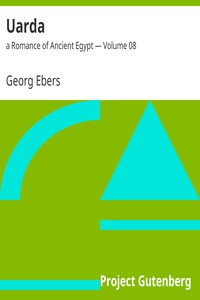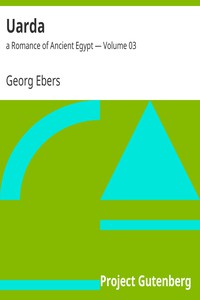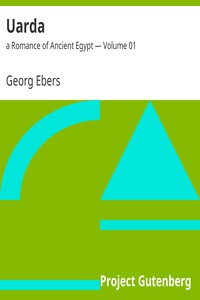Uarda : a Romance of Ancient Egypt — Volume 08 by Georg Ebers (e book reader txt) 📗

- Author: Georg Ebers
Book online «Uarda : a Romance of Ancient Egypt — Volume 08 by Georg Ebers (e book reader txt) 📗». Author Georg Ebers
At the door of the hut Pentaur was greeted by the princess's companions.
The chamberlain looked at him not without anxious misgiving.
The king, when he departed, had, it is true, given him orders to obey Bent-Anat in every particular, as if she were the queen herself; but her choice of such a husband was a thing unheard of, and how would the king take it?
Nefert rejoiced in the splendid person of the poet, and frequently repeated that he was as like her dead uncle—the father of Paaker, the chief-pioneer—as if he were his younger brother.
Uarda never wearied of contemplating him and her beloved princess. She no longer looked upon him as a being of a higher order; but the happiness of the noble pair seemed to her an embodied omen of happiness for Nefert's love—perhaps too for her own.
Nebsecht kept modestly in the background. The headache, from which he had long been suffering, had disappeared in the fresh mountain air. When Pentaur offered him his hand he exclaimed:
"Here is an end to all my jokes and abuse! A strange thing is this fate of men. Henceforth I shall always have the worst of it in any dispute with you, for all the discords of your life have been very prettily resolved by the great master of harmony, to whom you pray."
"You speak almost as if you were sorry; but every thing will turn out happily for you too."
"Hardly!" replied the surgeon, "for now I see it clearly. Every man is a separate instrument, formed even before his birth, in an occult workshop, of good or bad wood, skilfully or unskilfully made, of this shape or the other; every thing in his life, no matter what we call it, plays upon him, and the instrument sounds for good or evil, as it is well or ill made. You are an AEolian harp—the sound is delightful, whatever breath of fate may touch it; I am a weather-cock—I turn whichever way the wind blows, and try to point right, but at the same time I creak, so that it hurts my own ears and those of other people. I am content if now and then a steersman may set his sails rightly by my indication; though after all, it is all the same to me. I will turn round and round, whether others look at me or no—What does it signify?"
When Pentaur and the princess took leave of the hunter with many gifts, the sun was sinking, and the toothed peaks of Sinai glowed like rubies, through which shone the glow of half a world on fire.
The journey to the royal camp was begun the next morning. Abocharabos, the Amalekite chief, accompanied the caravan, to which Uarda's father also attached himself; he had been taken prisoner in the struggle with the natives, but at Bent-Anat's request was set at liberty.
At their first halting place he was commanded to explain how he had succeeded in having Pentaur taken to the mines, instead of to the quarries of Chennu.
"I knew," said the soldier in his homely way, "from Uarda where this man, who had risked his life for us poor folks, was to be taken, and I said to myself—I must save him. But thinking is not my trade, and I never can lay a plot. It would very likely have come to some violent act, that would have ended badly, if I had not had a hint from another person, even before Uarda told me of what threatened Pentaur. This is how it was.
"I was to convoy the prisoners, who were condemned to work in the Mafkat mines, across the river to the place they start from. In the harbor of Thebes, on the other side, the poor wretches were to take leave of their friends; I have seen it a hundred times, and I never can get used to it, and yet one can get hardened to most things! Their loud cries, and wild howls are not the worst—those that scream the most I have always found are the first to get used to their fate; but the pale ones, whose lips turn white, and whose teeth chatter as if they were freezing, and whose eyes stare out into vacancy without any tears—those go to my heart. There was all the usual misery, both noisy and silent. But the man I was most sorry for was one I had known for a long time; his name was Huni, and he belonged to the temple of Amon, where he held the place of overseer of the attendants on the sacred goat. I had often met him when I was on duty to watch the laborers who were completing the great pillared hall, and he was respected by every one, and never failed in his duty. Once, however, he had neglected it; it was that very night which you all will remember when the wolves broke into the temple, and tore the rams, and the sacred heart was laid in the breast of the prophet Rui. Some one, of course, must be punished, and it fell on poor Huni, who for his carelessness was condemned to forced labor in the mines of Mafkat. His successor will keep a sharp look out! No one came to see him off, though I know he had a wife and several children. He was as pale as this cloth, and was one of the sort whose grief eats into their heart. I went up to him, and asked him why no one came with him. He had taken leave of them at home, he answered, that his children might not see him mixed up with forgers and murderers. Eight poor little brats were left unprovided for with their mother, and a little while before a fire had destroyed everything they possessed. There was not a crumb to stop their little squalling mouths. He did not tell me all this straight out; a word fell from him now and then, like dates from a torn sack. I picked it up bit by bit, and when he saw I felt for him he grew fierce and said: 'They may send me to the gold mines or cut me to pieces, as far as I am concerned, but that the little ones should starve that—that,' and he struck his forehead. Then I left him to say good bye to Uarda, and on the way I kept repeating to myself 'that-that,' and saw before me the man and his eight brats. If I were rich, thought I, there is a man I would help. When I got to the little one there, she told me how much money the leech Nebsecht had given her, and offered to give it me to save Pentaur; then it passed through my mind—that may go to Hum's children, and in return he will let himself be shipped off to Ethiopia. I ran to the harbor, spoke to the man, found him ready and willing, gave the money to his wife, and at night when the prisoners were shipped I contrived the exchange Pentaur came with me on my boat under the name of the other, and Huni went to the south, and was called Pentaur. I had not deceived the man into thinking he would stop at Chennu. I told him he would be taken on to Ethiopia, for it is always impossible to play a man false when you know it is quite easy to do it. It is very strange! It is a real pleasure to cheat a cunning fellow or a sturdy man, but who would take in a child or a sick person? Huni certainly would have gone into the fire-pots of hell without complaining, and he left me quite cheerfully. The rest, and how we got here, you yourselves know. In Syria at this time of year you will suffer a good deal from rain. I know the country, for I have escorted many prisoners of war into Egypt, and I was there five years with the troops of the great Mohar, father of the chief pioneer Paaker."
Bent-Anat thanked the brave fellow, and Pentaur and Nebsecht continued the narrative.
"During the voyage," said Nebsecht, "I was uneasy about Pentaur, for I saw how he was pining, but in the desert he seemed to rouse himself, and often whispered sweet little songs that he had composed while we marched."
"That is strange," said Bent-Anat, "for I also got better in the desert."
"Repeat the verses on the Beytharan plant," said Nebsecht.
"Do you know the plant?" asked the poet. "It grows here in many places; here it is. Only smell how sweet it is if you bruise the fleshy stem and leaves. My little verse is simple enough; it occurred to me like many other songs of which you know all the best."
"They all praise the same Goddess," said Nebsecht laughing.
"But let us have the verses," said Bent-Anat. The poet repeated in a low voice:
"How often in the desert I have seen
The small herb, Beytharan, in modest green!
In every tiny leaf and gland and hair
Sweet perfume is distilled, and scents the air.
How is it that in barren sandy ground
This little plant so sweet a gift has found?
And that in me, in this vast desert plain,
The sleeping gift of song awakes again?"
"Do you not ascribe to the desert what is due to love?" said Nefert.
"I owe it to both; but I must acknowledge that the desert is a wonderful physician for a sick soul. We take refuge from the monotony that surrounds us in our own reflections; the senses are at rest; and here, undisturbed and uninfluenced from without, it is given to the mind to think out every train of thought to the end, to examine and exhaust every feeling to its finest shades. In the city, one is always a mere particle in a great whole, on which one is dependent, to which one must contribute, and from which one must accept something. The solitary wanderer in the desert stands quite alone; he is in a manner freed from the ties which bind him to any great human community; he must fill up the void by his own identity, and seek in it that which may give his existence significance and consistency. Here, where the present retires into the background, the thoughtful spirit finds no limits however remote."
"Yes; one can think well in the desert," said Nebsecht. "Much has become clear to me here that in Egypt I only guessed at."
"What may that be?" asked Pentaur.
"In the first place," replied Nebsecht, "that we none of us really know anything rightly; secondly that the ass may love the rose, but the rose will not love the ass; and the third thing I will keep to myself, because it is my secret, and though it concerns all the world no one would trouble himself about it. My lord chamberlain, how is this? You know exactly how low people must bow before the princess in proportion to their rank, and have no idea how a back-bone is made."
"Why should I?" asked the chamberlain. "I have to attend to outward things, while you are contemplating inward things; else your hair might be smoother, and your dress less stained."
The travellers reached the old Cheta city of Hebron without accident; there they took leave of Abocharabos, and under the safe escort of Egyptian troops started again for the north. At Hebron Pentaur parted from the princess, and Bent-Anat bid him farewell without complaining.
Uarda's father, who had learned every path and bridge in Syria, accompanied the poet, while the physician Nebsecht remained with the ladies, whose good star seemed to have deserted them with Pentaur's departure, for the violent winter rains which fell in the mountains of Samaria destroyed the roads, soaked through the tents, and condemned them frequently to undesirable delays. At Megiddo they were received with high honors by the commandant of the Egyptian garrison, and they were compelled to linger here some days, for Nefert, who had been particularly eager to hurry forward, was taken ill, and Nebsecht was obliged to forbid her proceeding at this season.
Uarda grew pale and thoughtful, and Bent-Anat saw with anxiety that the tender roses were





Comments (0)